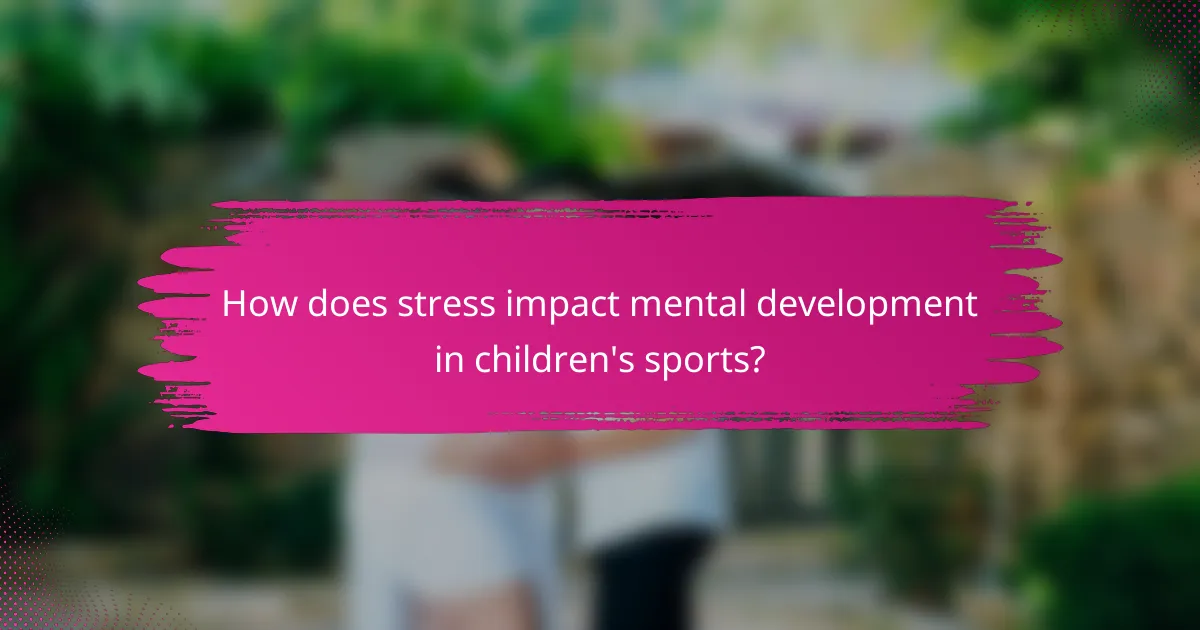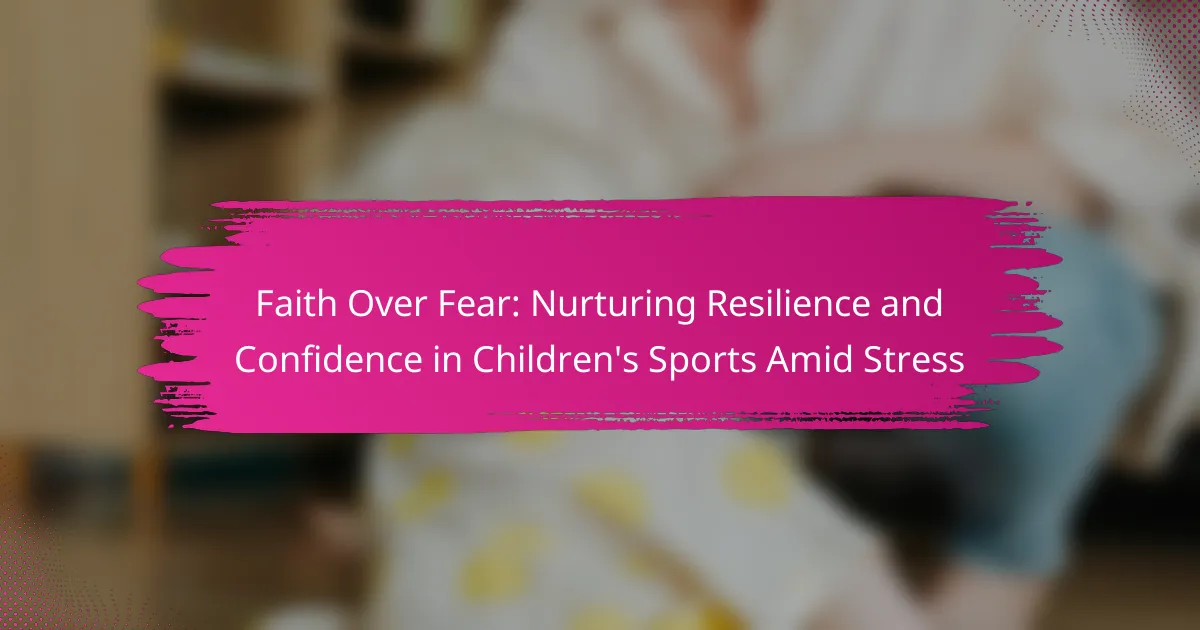Building resilience and confidence in children’s sports is essential to combat stress and enhance performance. High stress levels can hinder emotional regulation and motivation. This article explores strategies to nurture a positive mindset, establish supportive environments, and implement effective coping techniques. By focusing on effort and personal growth, young athletes can thrive in competitive settings.

How does stress impact mental development in children’s sports?
Stress negatively impacts mental development in children’s sports by hindering their resilience and confidence. High stress levels can lead to anxiety, reducing focus and performance. Research indicates that children exposed to chronic stress may struggle with emotional regulation, affecting their ability to cope with challenges in sports. This can result in a lack of motivation and lower self-esteem, further impeding their athletic growth. Nurturing a supportive environment can help mitigate these effects, fostering a positive mindset that enhances both performance and enjoyment in sports.
What are the signs of stress in young athletes?
Young athletes may exhibit signs of stress through changes in behavior, mood, and performance. Key indicators include increased anxiety, withdrawal from activities, irritability, and a decline in motivation. Physical symptoms may manifest as fatigue, headaches, or sleep disturbances. Monitoring these signs is essential for fostering resilience and confidence in sports.
How can stress affect performance and enjoyment in sports?
Stress negatively impacts performance and enjoyment in sports by reducing focus and motivation. High levels of stress can lead to anxiety, which hinders children’s ability to perform at their best. Stress can also diminish the joy of participation, as children may associate sports with pressure rather than fun.
Nurturing resilience and confidence is essential. Techniques such as positive reinforcement and stress management strategies can help children cope with competitive pressures. For instance, teaching relaxation techniques can improve their emotional regulation, enhancing both performance and enjoyment.
Research indicates that athletes who manage stress effectively experience higher satisfaction in their sports activities. A study found that children with strong coping mechanisms reported increased enjoyment and better performance outcomes. This highlights the importance of fostering a supportive environment that prioritizes mental well-being alongside physical skills.

What universal strategies can nurture resilience in young athletes?
To nurture resilience in young athletes, focus on fostering a positive mindset and strong support systems. Encourage open communication, set realistic goals, and celebrate small achievements.
1. Promote a growth mindset by emphasizing effort over results.
2. Establish a routine that includes mental skills training.
3. Create a supportive environment with positive reinforcement.
4. Encourage problem-solving and coping strategies during challenges.
5. Involve parents and coaches in resilience-building activities.
How does positive reinforcement build confidence?
Positive reinforcement builds confidence by encouraging children to recognize their abilities and achievements. This approach fosters a positive self-image, enabling them to tackle challenges in sports. For instance, receiving praise for effort reinforces persistence, leading to improved performance. As a result, children develop resilience, learning to overcome stress and fear in competitive environments. This method not only enhances their skills but also cultivates a lasting belief in their capabilities.
What role do supportive coaches and parents play?
Supportive coaches and parents play a crucial role in fostering resilience and confidence in children’s sports. They provide emotional encouragement, helping children manage stress and build a positive mindset. This support can enhance a child’s performance, leading to greater enjoyment and persistence in sports. Research shows that children with supportive adults are more likely to develop a growth mindset, viewing challenges as opportunities rather than obstacles. Such an environment nurtures both their athletic skills and overall well-being.
How can goal-setting enhance mental strength?
Goal-setting enhances mental strength by providing clear objectives that foster resilience and confidence in children’s sports. By focusing on achievable goals, children learn to manage stress and overcome challenges. This process builds a growth mindset, allowing them to view setbacks as opportunities for improvement. Research indicates that goal-setting can lead to increased motivation and performance, reinforcing a positive self-image.

What unique approaches foster confidence in children amidst competition?
Fostering confidence in children amidst competition requires unique approaches that emphasize resilience. Encouraging a growth mindset allows children to view challenges as opportunities for development. Positive reinforcement boosts their self-esteem, while teaching coping strategies helps them manage stress effectively. Additionally, creating a supportive environment where effort is valued over winning fosters intrinsic motivation. Engaging in team-building activities enhances social skills, promoting collaboration rather than rivalry. Ultimately, these approaches nurture a sense of belonging and self-worth, empowering children to thrive in competitive settings.
How can visualization techniques improve performance?
Visualization techniques enhance performance by fostering mental resilience and confidence in young athletes. These methods help children manage stress, visualize success, and develop a positive mindset. For instance, imagery training allows athletes to mentally rehearse their skills, which can lead to improved execution during competitions. Research indicates that athletes who practice visualization experience reduced anxiety and increased focus, directly impacting their performance levels. By integrating these techniques into training, coaches can nurture a supportive environment that promotes both emotional and athletic growth.
What are the benefits of mental skills training?
Mental skills training enhances resilience and confidence in children’s sports by fostering emotional regulation, focus, and positive self-talk. These skills help young athletes manage stress effectively and improve performance under pressure. Research indicates that children who engage in mental skills training experience increased motivation and better teamwork, leading to overall enhanced athletic experiences.

What rare attributes contribute to long-term success in youth sports?
Resilience, emotional intelligence, and adaptive strategies are rare attributes that significantly contribute to long-term success in youth sports. Resilience allows young athletes to recover from setbacks, fostering a growth mindset. Emotional intelligence enhances their ability to understand and manage emotions, leading to better teamwork and communication. Adaptive strategies enable athletes to adjust their approach based on different situations, promoting sustained engagement and performance.
How can early exposure to diverse sports shape resilience?
Early exposure to diverse sports fosters resilience by teaching children to adapt to challenges. Engaging in various athletic activities enhances problem-solving skills and builds confidence. Research indicates that children involved in multiple sports develop a greater ability to handle stress and setbacks. This unique attribute of diverse sports participation cultivates a mindset that values perseverance over fear, ultimately nurturing long-term resilience.
What impact does mentorship have on young athletes?
Mentorship significantly enhances young athletes’ resilience and confidence by providing guidance and support. Mentors share experiences that help athletes manage stress and overcome challenges. This relationship fosters a sense of belonging and encourages personal growth. Research indicates that athletes with mentors are more likely to demonstrate improved performance and mental health.

How can parents effectively manage their child’s sports-related stress?
Parents can effectively manage their child’s sports-related stress by fostering a supportive environment. Encourage open communication, allowing children to express their feelings about competition and performance. Teach coping strategies, such as mindfulness and breathing exercises, to help them manage anxiety. Focus on effort rather than outcomes, reinforcing the value of personal growth and resilience. Lastly, ensure participation remains enjoyable, prioritizing fun over pressure to win.
What communication strategies can help alleviate pressure?
Effective communication strategies can significantly reduce pressure in children’s sports. Encouraging open dialogue fosters trust and understanding. Active listening allows children to express their feelings, helping to identify stressors. Positive reinforcement builds confidence, while setting realistic expectations alleviates performance anxiety. Regular check-ins maintain emotional connection and support resilience.
How can parents encourage a balanced perspective on winning and losing?
Parents can encourage a balanced perspective on winning and losing by emphasizing the importance of effort and personal growth over outcomes. They should celebrate resilience and teamwork, fostering an environment where mistakes are seen as learning opportunities. Engaging children in discussions about their experiences can help them articulate their feelings regarding competition. Additionally, modeling a healthy attitude toward winning and losing reinforces these values.

What best practices can coaches implement to support mental development?
Coaches can implement several best practices to support mental development in young athletes. Fostering a positive environment enhances resilience and confidence.
Encourage open communication to help children express their feelings and challenges. This builds trust and promotes emotional intelligence. Incorporate mental skills training, such as visualization and goal setting, to develop focus and motivation.
Regularly provide constructive feedback, emphasizing effort over outcome, to nurture a growth mindset. Lastly, model resilience by sharing personal experiences of overcoming challenges, reinforcing that setbacks are part of the learning process.
How can team-building activities enhance resilience?
Team-building activities enhance resilience by fostering collaboration and trust among children in sports. These activities create a supportive environment where children learn to face challenges together. As a result, they develop confidence in their abilities and improve their coping strategies under stress. Engaging in team-building exercises allows children to practice communication and problem-solving skills, which are essential for resilience. Ultimately, this nurturing approach contributes to their overall performance and emotional well-being in sports.
What are common mistakes coaches make regarding athlete mental health?
Coaches often overlook athlete mental health by prioritizing performance over well-being. Common mistakes include neglecting open communication, failing to recognize signs of stress, and not fostering a supportive environment. Coaches may also impose unrealistic expectations, which can diminish resilience and confidence. Additionally, they might lack training in mental health awareness, leading to inadequate support for athletes facing challenges.
How can coaches create a positive and inclusive environment?
Coaches can create a positive and inclusive environment by fostering open communication and encouraging teamwork. This approach nurtures resilience and confidence in children, helping them thrive in sports. Establishing clear expectations and promoting mutual respect are essential. Incorporating diverse activities allows every child to participate, reinforcing a sense of belonging. Recognizing individual strengths enhances self-esteem, motivating athletes to overcome stress and challenges.

What actionable tips can young athletes use to build confidence?
Young athletes can build confidence by focusing on positive self-talk, setting achievable goals, and embracing mistakes as learning opportunities. Developing a routine that includes visualization techniques can also enhance their mental resilience. Regular practice and seeking feedback from coaches will further reinforce their skills and self-belief.
How can self-reflection improve mental resilience?
Self-reflection enhances mental resilience by fostering self-awareness and promoting adaptive coping strategies. It allows children in sports to recognize their emotions, evaluate their responses to stress, and develop a growth mindset. This process strengthens their ability to face challenges and setbacks, ultimately nurturing confidence and resilience. Regular self-reflection can lead to improved performance and emotional regulation, essential for navigating competitive environments.
What techniques can athletes use to cope with performance anxiety?
Athletes can cope with performance anxiety through techniques such as visualization, breathing exercises, and positive self-talk. Visualization involves imagining successful performances, which can enhance confidence. Breathing exercises help regulate physiological responses, reducing anxiety levels. Positive self-talk reinforces a resilient mindset, helping athletes focus on their strengths. These methods nurture confidence in children’s sports, allowing them to thrive under pressure.
How can young athletes cultivate a growth mindset?
Young athletes can cultivate a growth mindset by embracing challenges, learning from failures, and seeking feedback. This mindset fosters resilience and confidence, critical for navigating stress in sports. Encouragement from coaches and parents enhances this process by reinforcing positive self-talk and goal-setting. Research indicates that athletes with a growth mindset demonstrate improved performance and persistence, highlighting its unique attribute in youth sports development.


